Recently, author Louise Walters and I discovered we were reading Penelope Lively’s Moon Tiger at the same time – for me, a first reading and for Louise a re-read. We thought it might be fun to talk about it afterwards. Here’s what we thought. Warning: if you haven’t read it, there are a couple of spoilers in our discussion…
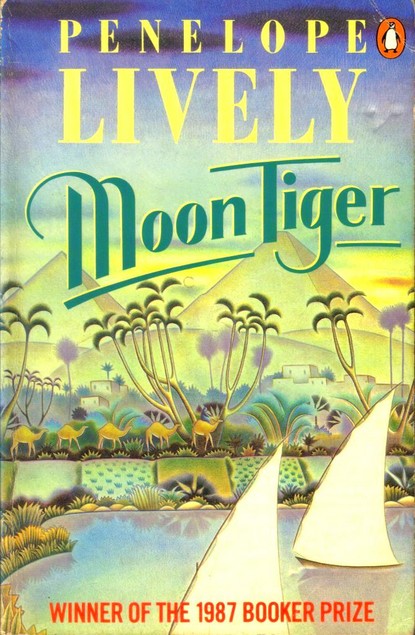
RM: Well,
Moon Tiger was a revelation to me. I’ve never read anything quite like it. What
struck me most was the guts of the writer in revealing the narrative through so
many different lenses, and yet this never jars. Not only does Lively use the
perspectives of different characters to shine a light on the same event in
contrasting ways, but she also switches between third and first person from the
main character Claudia, often on the same page or even within the same
paragraph at times. One would think this would be very difficult to follow, or
at least terribly annoying, but it’s not, not at all. In fact, it’s incredibly
illuminating, as it allows the reader to experience everyone’s thoughts at
once, seamlessly – and the characterisation is so sharply defined that I never
felt confused about whose mind I was in, not once.
And the
genius of all this is not that it’s a clever and tricksy way of writing a
story, but that it is the perfect vehicle for what the novel is all about – the
history of one person and the history of the world simultaneously, and a
meditation upon the individual’s place within that world, within history. The
chosen events – such as WW2 Egypt or the 1956 Hungarian Revolution or the
Cold War – all these are significant moments in history which are brought
sharply to life by being given a personal perspective of what is lost and
gained, on the ground, as it were. At the same time, the novel is intensely
personal, such as the detailing of Claudia’s unusually close relationship with
her brother (much of which is also very funny!). So individual lives are never
lost to the grander narrative, and the weight of history is never forgotten
even within the minutiae of people’s lives. So damn clever!
The love
story at the heart of the novel – with Tom in wartime Egypt – is so beautiful
and touching, that there was a part of me that wanted that to be enlarged and
take over the whole novel. And yet, when I’d finished reading the book, I
realised what a brilliant (and brave) choice that was to limit that section,
and only bring it back in all its richness for a brief episode at the very end
of the book; brave because it would be tempting to write a novel about a
wartime romance in all its passion and loveliness and let that become the point
of the story, and yet this novel is about so much more than that, but at the
same time it manages to put across the shining, essential and absolutely
central resonance of this event in Claudia’s life. By doing this, what Lively
conveys is the fleeting nature of joy in human lives. It reminds me of a poem I
was looking at just the other day, by John Norris called ‘The Parting’:
How fading
are the joys we dote upon,-
Like
apparitions seen and gone:
But those
which soonest take their flight,
Are the most
exquisite and strong,
Like angels’
visits, short and bright;
Mortality’s
too weak to bear them long.
Some nice
chap said on Twitter this book was like a giant poem and I agree with him. It’s
a beautifully poetic meditation on history, personal lives, the mind and
memory, birth, life and death, without being pretentious or hard to read or
unfathomable in any way, it slips by as you turn the pages and stays long in
the mind afterwards. It’s a bloody masterpiece!
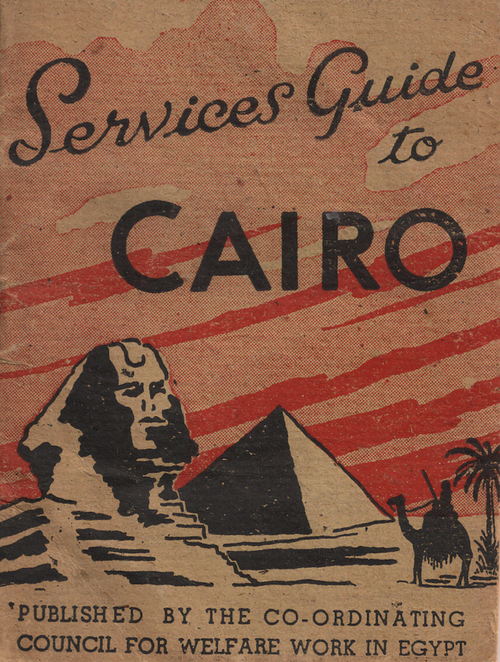
LW: I’m so
happy that you love Moon Tiger as much as I do. I find myself an agreement with
everything you say about it. I read it about three years ago and thought it one
of the best novels I’ve read. I read it again recently, and the second reading
has confirmed that it truly is one of the best novels I’ve read! Technically
it’s a tour de force and breaks all the rules. Multiple POVs and first and
third person for the protagonist, Claudia, and as you say, sometimes in one
paragraph. A definite no-no for most of us, but somehow Penelope Lively pulls
it off, so much so that I failed at first to even notice the POV switches, as
absorbed as I was in the world of her novel.
I love the
confidence of Moon Tiger – Lively’s strident, self-assured writing that mirrors
the absolute self-belief of Claudia, the central character. Claudia is superior
and conceited (at one point she declares she was easily the best-looking of the
foreign journalists in Egypt). She is unconventional (one of my favourite traits
in people) but she is not a great mother. I felt sorry for her daughter Lisa,
who as a child was brought up largely by her grandmothers. I wanted Claudia to
be a “better” mother… but at the same time I think that would have
diminished her personality. Likewise, Claudia’s close, at times sexual
relationship with her brother Gordon is quietly disturbing. I also thought the
two of them were unkind to Sylvia, Gordon’s wife, often excluding her,
effectively making her a gooseberry in her own marriage.
But
ultimately, Claudia is vulnerable, like all of us. Her love affair with Tom is
beautifully depicted and her fears for his safety are palpable. Her agonising
wait after hearing Tom is “missing”, then the almost matter-of-fact
confirmation of his death, are devastating. This is followed by the loss of
Tom’s unborn baby, very much wanted by her. This is the low point of her life,
and it’s heart-breaking. I wonder if the loss of this baby affected her
relationship with Lisa later. Lisa is Jasper’s child, not Tom’s, and Jasper
plays second-fiddle to Tom. While Jasper is “fun to go to bed with”
(love that frank honesty), he clearly cannot hold a candle to Tom.
The dipping
in and out of Claudia’s memories is a successful attempt to portray how we all
remember our pasts. Memories are jumbled, muddled, arbitrary. In old age, we
are very much alone with them, and this is beautifully explored in Moon
Tiger.
I think at
this point we need to mention The English Patient, a novel similar in both
style, theme and location. I’m a huge fan of the film. But I’m disappointed
that Moon Tiger (written about six years earlier) is not as famous and has not
been filmed. But that may be a different conversation!
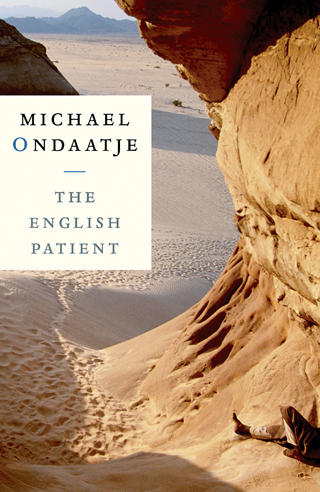
RM: Wow,
your reference to The English Patient is spot on. I was reminded of that film a
lot whilst reading, particularly the desert sections of course, and the tragic
love affair. What’s interesting about that story to me is that I read the book
and saw the film, and ended up much preferring the film. The book was
beautifully written, I thought, yet the love affair did not take flight for me
in the way it did in the movie, and that aspect of the book frustrated me at
the time. It left me feeling it was a little cold in its telling and the attitude
towards its characters, whilst the movie was all heart, it seemed to me. Yet I
did read it in my 20s, and I’m wondering if I read it again now, whether I’d
have the same reaction; perhaps that was a young person’s reaction to a complex
novel, wanting to simplify it and make it about the romance whilst it’s
actually about so much more than that. Perhaps if I’d read MT in my 20s I might
have found all the parts that were not in Egypt a bit tiresome, who knows! I
absolutely agree that MT should be made into a film – not a simple task, as it
all goes on inside her head of course, but movies can use fade-outs and
flashbacks and all sorts of trickery to convey that fluid movement between
minds that the novel finds so easy.
I agree
Claudia’s personality is difficult and that is what makes her interesting! I
can imagine some readers finding her insufferable, but what I think Lively does
here is show us her vulnerability, as you so rightly say, by always giving her
internal reactions to events which contrast so sharply with the reactions of
those around her. So, for example, one sees Sylvia holding back tears in the
taxi at her husband’s impending death & her anger at Claudia for arguing
with him (Claudia’s brother) – which is very touching – and then we leap to Claudia’s
viewpoint where we realise how much her brother is enjoying this last hurrah,
and I totally sympathised with Claudia when she said she wanted to boot Sylvia
out of the taxi!! Again, I too felt sorry for her daughter, and was thrilled
when Lisa reveals in her thoughts that she has a secret lover that not even her
all-knowing mother knows about! But then again, I just found it tragic that
they never really understood each other. Personally, I think it was all wrapped
up with the fact of the miscarriage and that Lisa was almost set up to be a
disappointment, as she was not Tom’s lost baby and never would be. Not her
fault, not anyone’s fault. So sad.
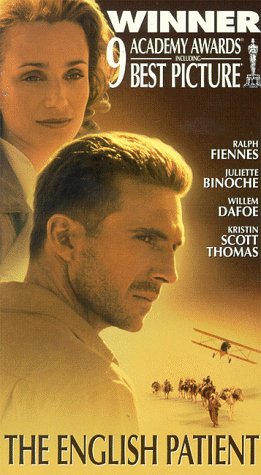
LW: I agree,
The English Patient film was far more enjoyable than the book, which I found
too oblique, too “literary” possibly. I think the film extracts the
story at the novel’s rather obscured heart and turns it into an intriguing,
tragic love story. My favourite parts of the film though are the scenes with
Hana and Almasy in the deserted monastery in Italy. Beautiful. Anyway, we’re
not talking about The English Patient!
I wonder how
a film adaptation would tackle Moon Tiger, which I think is a much better
written book than The English Patient. I think any film maker would make Tom
and Claudia’s love affair the central narrative. I imagine it would be filmed
in a similar fashion to The EP – lots of to-ing and fro-ing, flashbacks, fading
into the past and present. Perhaps that’s why it’s not been filmed? It’s
already been done. But how come The EP got there first as it was written
several years later??
Claudia as a
mother is a bit of a thorny issue isn’t it – she’s not a good mother, even if
you take into account her career and her single-parent status (not easy in
those days). I wanted her to be a better mother but as I said, that would have
made both Claudia and the novel less interesting, possibly. Lisa is nothing
like her mother and that contributes to Claudia’s loneliness at the end of her
life, yet you can’t blame Lisa for being cool and distant.
What did you
think of Lazslo? To me, he’s kind of the weak point in the plot, if there
is one. (If there was, Lazslo would be it!). I wonder if the novel would
function without him. Yet he is loyal and a friend to the end, so I can see the
role he plays. I just wonder if it was necessary? What do you think? He does of
course leave Tom’s diary for Claudia… but could somebody else have done that?
Perhaps not.
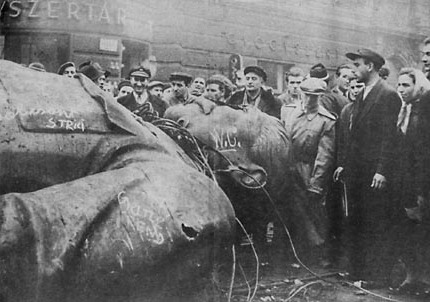
1956 Hungarian Revolution
RM: Yeah,
Laszlo annoyed the heck out of me and I wondered why he was there. But I
suppose it was a substitute son for her and she probably would have been better
off having a son – I don’t think she liked women very much, do you? And there
are women like that, so it’s true to a certain type of person. I think she
found the competition of other women unequal and difficult. But could respond
to men far more easily and felt comfortable with them i.e. found no problem at
all being a woman in a man’s world – such as out in Egypt, where she was
frustrated by being treated differently and yet used it to her advantage too at
points. I think she had no idea how to handle a daughter but, probably through
her close relationship with her brother she would have been better with a son.
And I think Laszlo is there to serve that purpose, but also he is difficult too
and not particularly attractive, also thorny like her, so they are kindred in
that way, which explains why nobody else in the novel likes him either, except
her, or even us as readers! He also serves to bring in modern history too, of
course, with his family situation and is an example of how historical events
shape real people’s lives on the ground. She had no real interest in her
daughter, sadly, and so Laszlo helped to partly fill the abyss after the loss
of Tom in a way her daughter and Jasper never could. Because Laszlo is such a
problem person and in such a problematic seemingly impossible situation, he
keeps her busy, mind, body and soul. Perhaps that’s why in the end she is
closest to him than almost anyone, as he saved her almost as much as she saved
him.
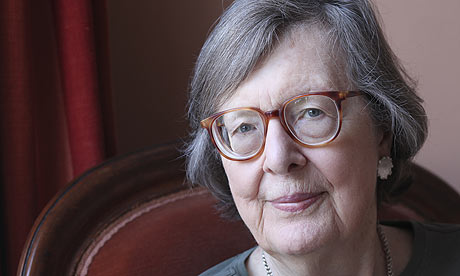
Penelope Lively
I asked Louise to end with a summary of what the
book meant to her:
LW: It’s one
of those books that I’m so glad I found (I got my copy in a charity shop). I
wasn’t too aware of PL’s adult novels but enjoyed her children’s work,
particularly A Stitch in Time, a book I read and re-read often as a child. I
still have my old copy, I won’t ever part with it, and that’s exactly how I
feel about Moon Tiger. Most definitely not destined for my local Oxfam
Bookshop!
I love
everything about Moon Tiger and it’s one of the few books I’ve read where I
“forget” I’m reading. Moon Tiger is an experience, not just a novel.
The fact that you are reading it is almost immaterial, so powerful is the story
and the quality of the writing. I could see, smell and hear Egypt. I hope the
novel will be an influence on my own writing, although I think these things
take a long time to sink in, so time will tell. It is one of my very favourite
novels, if not my favourite (Jane Eyre might have to be relegated!)

Louise Walters
What do you think of Moon Tiger? Let us know!
Get in touch on social media:
https://twitter.com/rebeccamascull
https://twitter.com/LouiseWalters12
https://www.facebook.com/RebeccaMascull
https://www.facebook.com/LouiseWaltersWriter
Thanks for reading. 🙂